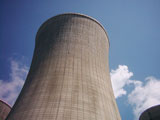Italy's Nuclear Ambitions
By Eric J Lyman for ISN
On 24 February, Italy took its most concrete step yet it its return to nuclear power, signing an agreement with neighbor France to develop at least four state-of-the-art EPR nuclear reactors.
Italian premier Silvio Berlusconi and French counterpart Nicolas Sarkozy signed the agreement with great fanfare in Rome, both calling it a major milestone for nuclear technology in Europe. "The future of renewable energy is nuclear power," a beaming Berlusconi declared.
The 72-year-old Berlusconi, a polarizing figure since he burst onto the Italian political in 1994, is an easy figure to criticize. Legal problems - charges that he has manipulated the Italian legal system and used political office to line his own pockets and enrich his media empire - have rightfully dogged Berlusconi for years. His verbal gaffes produce giggles in European capitals. His vain efforts to remain in the spotlight no matter what the costs can seem tragic.
But this time, Berlusconi may be right.
Much of the criticism against the nuclear power plans is historical. In 1987, 19 months after the nuclear reactor meltdown in Chernobyl in the then-Soviet Union, Italians went to the polls and voted overwhelmingly to reject a referendum that would have allowed the country's fledgling nuclear power industry to dramatically expand. Within two months of the vote, then-prime minister Giovanni Goria signed a decree halting work on a nearly completed reactor in Montalto di Castro, just north of Rome. By 1990, the country's two remaining nuclear generators, both in northwestern Italy, were shut down.
The 1987 referendum and the subsequent steps were hailed as a triumph of environmentalism. No more fears of nuclear meltdowns. No more toxic nuclear waste to dispose of.
But a lot has changed since then. EPR technology - the acronym stands for either Evolutionary Power Reactor or European Pressurized Reactor, depending on where it is marketed - has far more safety features than traditional water-cooled reactors. The waste it produces is more toxic than traditional nuclear waste, but mostly because it is more concentrated.
More importantly, it will be a major step in Italy's desire to become more energy independent. Both Italy and France are relatively poor in terms of natural resources. As such, Italy imports about 87 percent of the energy it uses. But that is about the same percentage of France's energy needs generated by nuclear power. In fact, France is a net exporter of electricity, selling about a fifth of its total production to Germany, Great Britain, the Netherlands - and to Italy, which receives about 10 percent of its power from French nuclear reactors.
Of course, Italy will not reverse the trend with the four plants agreed to by Berlusconi and Sarkozy. France operates 59 nuclear reactors, with five more (including two EPR plants) in the works. But projections are that the four Italian plants will produce about as much power as Italy currently imports from France - an amount that should not be scoffed at. Plans are for more reactors to follow the four were agreed to in February.
Most environmental groups still oppose nuclear power. Yet the strongest arguments in favor of further development of may be the potential impact on greenhouse gas emissions scientists say are responsible for climate change. Italy, with an economy nearly 25 percent smaller than France's based on International Monetary Fund figures, produces around 20 percent more greenhouse gas emissions, even though close to 7/8 of its electricity is imported (most of the gas emissions produced by power generation are accounted for in the country where the power is generated).
Without a doubt, there are valid concerns in the nuclear debate. The problem of waste is not one that will be easily solved. Measures to prevent potential meltdowns are strong but should be improved. And there are fears that a focus on nuclear power could hurt the development of more traditional renewable energy sources like wind or solar power. But none of these are reasons to abandon the development of a technology that a growing number of key environmental players believe will play a central role in curbing greenhouse gas emissions.
Yvo de Boer, the UN's top climate change official, said at the body's climate change summit in Poland last December that it was "difficult to imagine a scenario where long-range emissions reductions targets are met without the use of nuclear power."
Stephen Tindale, a former Greenpeace UK executive director and nuclear disarmament activist, has recently declared himself in favor of nuclear energy, calling it the lesser of two evils.
"Human survival is dependent on very rapid reductions in carbon dioxide emissions so the radioactive waste issues, the pollution from nuclear power stations, the radioactive pollution, those are not insignificant but they are not as great a threat in our view as climate change itself," Tindale said during an interview with the Australian Broadcasting Corporation.
Europe is in the midst of re-evaluating its stance on nuclear power. Though Germany is a notable exception, most of the continent is giving nuclear power a long look as it becomes increasingly wary of a future dependent on oil from the Middle East and gas from Russia. It's not insignificant that, Italy, so long among Europe's laggards in terms of economic growth and political stability will suddenly find itself thrust into the Europe's vanguard in an area that will only become more important with time.
